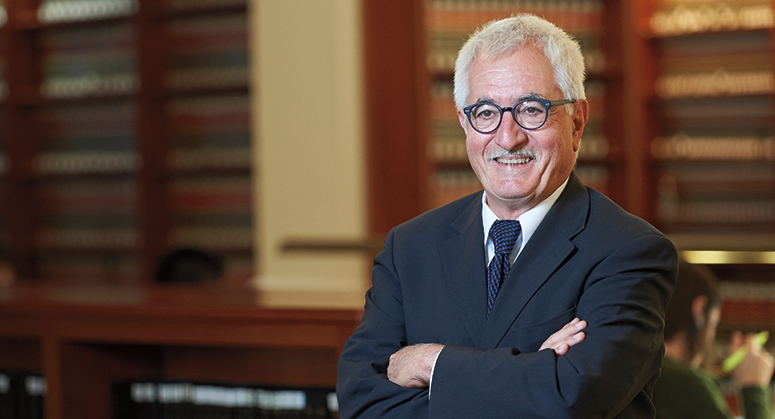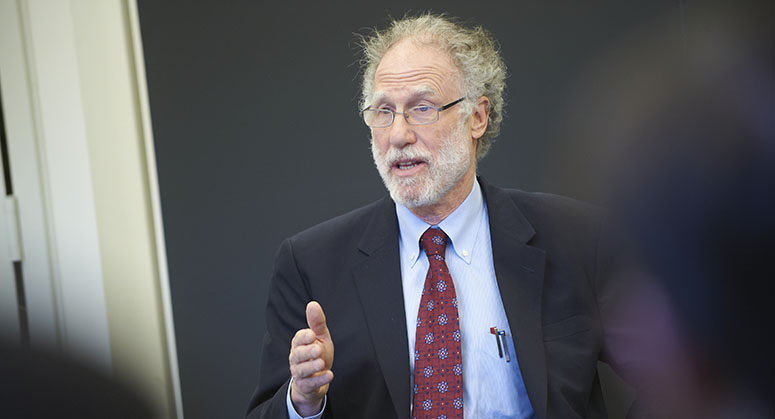The study of law is deeply intertwined with the democratic political process and the institutional structure of government. What makes NYU Law exceptional is the breadth and depth of expertise in political science and related disciplines that the faculty brings to exploring the law-politics interface. A comprehensive survey of interdisciplinary research and teaching at the intersection of law and politics would include empirical and theoretical investigations of Congress, the presidency, courts, and bureaucracy; the political economy of state and local governments; international relations, global governance, and the comparative study of political institutions; liberalism and its critics; democratic theory; and much else. Here are just a few of the interdisciplinary currents coursing through the faculty and classrooms of the Law School:
The Colloquium on Law, Economics, and Politics, led by John Ferejohn and Lewis Kornhauser, brings law faculty together with social scientists from NYU and other universities to engage with cutting-edge interdisciplinary work focused on the positive theory of political institutions and quantitative analysis. One of the leading political scientists of his generation, Ferejohn has produced scholarship central to the development of positive political theory and its application to the study of legal and political institutions. Kornhauser, a leading legal economist, has done pathbreaking work on judicial decisionmaking, including a series of important articles with Princeton political scientist Charles Cameron, who is a regular visitor at the Law School.
A number of other NYU Law faculty also pursue the interdisciplinary study of political institutions from various angles. The author of an acclaimed book on the politics surrounding the Supreme Court throughout American history, Barry Friedman is working with a group of political scientists to develop a trailblazing course and casebook on judicial decisionmaking that marries the most sophisticated work in the social sciences with normative and institutional legal questions. Dean Emeritus Richard Revesz (on leave), a leading scholar of regulatory law and policy, has done canonical work at the intersection of law and political science on judicial ideology and panel effects and the political economy of environmental regulation. Adam Cox and Ryan Bubb are prominent examples of a younger generation of NYU Law faculty who are producing theoretical and empirical studies of political institutions in conversation with both lawyers and social scientists.
The legal framework of democracy
Samuel Issacharoff and Richard Pildes are largely responsible for creating the interdisciplinary field of the Law of Democracy. Their influential course and casebook explores legal and policy issues concerning the structure of democratic elections and institutions, such as the role of money in politics, the design of election districts, the regulation of political parties, the design of voting systems, the representation of minority interests in democratic institutions. Beyond this, Pildes has written extensively on the rise of political polarization in the United States, the dysfunction of America’s political processes, and the “romanticization” of democracy in this country. Issacharoff’s most recent book, Fragile Democracies: Contested Power in the Era of Constitutional Courts, is a major comparative assessment of the role of courts in countries making the transition to democracy. A further bridge between academia and the real world of law and politics comes in the person of Robert Bauer, former White House counsel to President Obama, election law expert, and now Professor of Practice and co-director of the Legislative and Regulatory Process Clinic.
International relations and global governance
In NYU Law’s leading program in international legal studies, social scientific and theoretical approaches to the study of politics play out on the global stage. Colloquia in Global and Comparative Public Law, Institute for International Law and Justice, and Law and Development bring a steady stream of interdisciplinary scholars to the Law School. Ryan Goodman writes about human rights, the law of armed conflict, and US national security law from an interdisciplinary perspective and co-directs the Reiss Center on Law and Security, a non-partisan research institute focused on cultivating an informed dialogue and conducting groundbreaking research on important national security issues with Samuel Rascoff. Globally prominent scholars Joseph Weiler, Gráinne de Búrca, and Mattias Kumm explore the law and politics of the European Union.
Political theory
The NYU Law faculty boasts a number of eminent political theorists. One of the foremost legal and political philosophers in the world, Jeremy Waldron has published numerous books and articles on theories of rights, constitutionalism, the rule of law, democracy, property, dignity, hate speech, and international law. A leading theorist of political liberalism, Stephen Holmes has written widely about the disappointments of democratization after communism and the difficulty of combating terrorism within the limits of liberal constitutionalism. Moshe Halbertal is a wide-ranging scholar of philosophy, political theory, and Jewish thought who has authored significant books on sacrifice, idolatry, and Maimonides. The latest addition to this illustrious group is Anthony Appiah, a leading moral and political philosopher and one of the nation’s best-known thinkers on race and society.
Law students interested in studying political science can take up to 10 credits from the NYU Department of Politics. The Law School also offers a JD/PhD program in politics and law.
Core Faculty
John Ferejohn Barry Friedman David Golove Ryan Goodman Stephen Holmes Samuel Issacharoff Benedict Kingsbury Lewis Kornhauser Mattias Kumm Richard Pildes Jeremy Waldron


